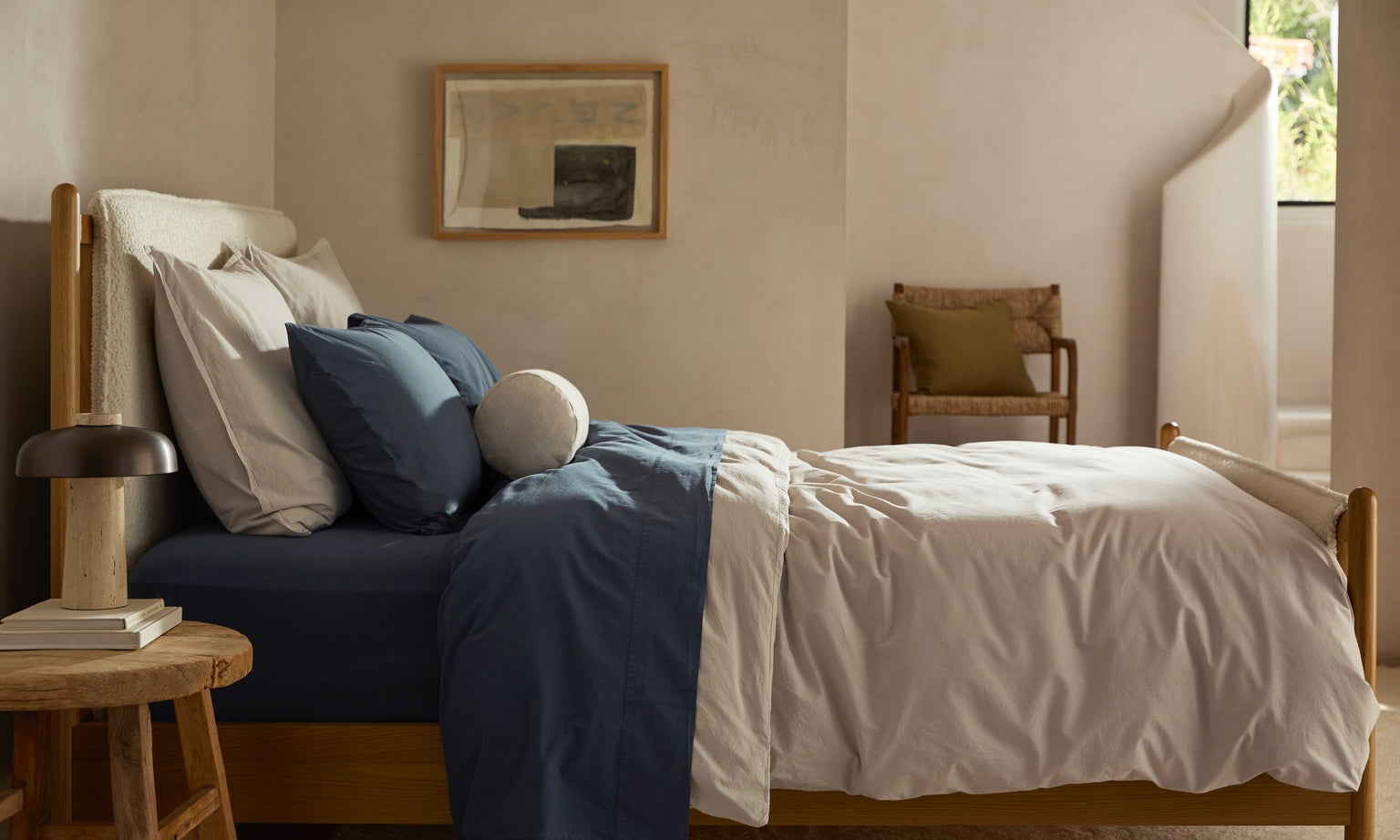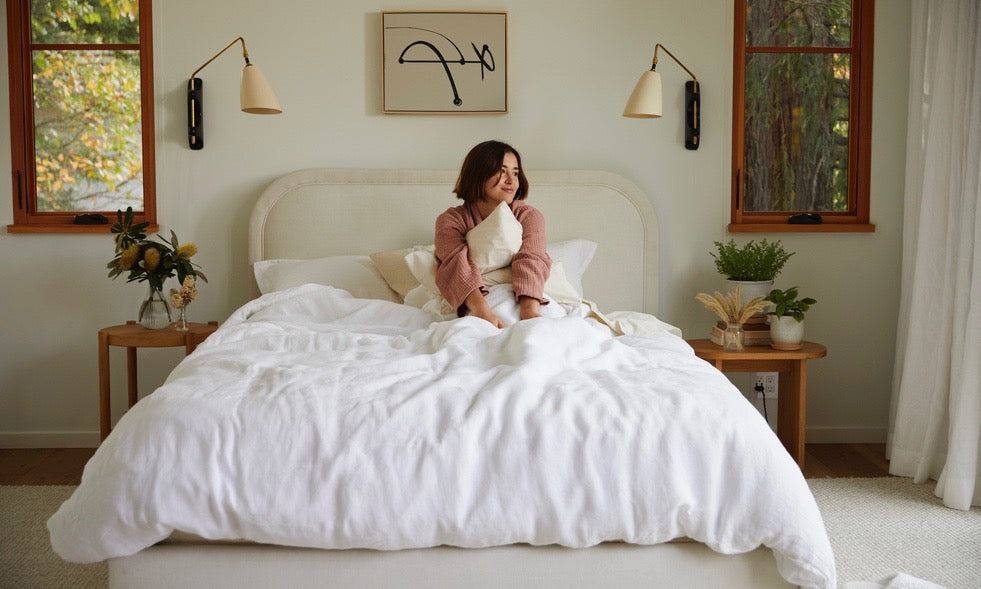
Experts Answer: Why is Sleep so Important?
We hosted a panel on sleep and wellness for Mental Health Awareness Month.
In support of mental health awareness month, our SoHo store hosted a panel with Alma – a community of therapists, coaches and wellness professionals – to discuss the importance of sleep and why we should all be getting more. Throughout the evening, moderator Verena Michelitsch – founder of Sand & Such, a magazine dedicated to sleep – sat down with Andrea Lopez-Yianilos, an Alma member and sleep specialist, Ellie Burrows Gluck, the founder and CEO of MNDFL, and Dr. Alex Capano, Chief Science Officer of Ananda Hemp. And while guests sipped on herbal teas and crunched on crudité, an honest discussion on sleep and mindfulness ensued. Below is a recap of the panel so you, too, can wake up healthy and rested.

What’s actually happening when we’re sleeping – and why is it so important?
Lopez-Yianilos
There are several important processes occurring when we sleep, such as memory consolidation and muscle repair. When an individual is chronically sleep deprived, stress hormones (e.g., cortisol) are found at higher levels in the body, which lead the body to consistently be “fight or flight” mode. It’s important to get adequate and quality sleep in order for our body to healthily regulate itself.
Can you define “good sleep” and explain the concept “sleep hygiene”?
Lopez-Yianilos
“Good sleep” is defined by having an adequate amount of sleep for your body and good quality of sleep. Every person needs a different amount of sleep. A number that is consistently advised by medical professionals is eight hours; however, that is the average across the population. Some individuals need as little as 4-5 hours or as much as 10-12 hours of sleep, albeit that is more rare. Most people need between 7.5-8.5 hours of sleep. Sleep hygiene entails having a healthy routine and behaviors around sleep. This includes using the bed only for the three S: sleep, sex, sick – meaning no TV, smart phones, reading, eating or arguing in bed. Additionally, reducing the intake of substances that negatively impact sleep (caffeine, alcohol, and nicotine), avoiding naps, keeping a consistent wake time and exercising daily are all part of sleep hygiene.
Can you talk about the practice and benefits of meditation and mindfulness – and their connection to better sleep?
Burrows Gluck
First let’s clarify what mindfulness is. In the meditation world, many of us have a favorite definition which comes from preeminent master teacher and founder of Mindfulness-Based Stress Reduction, Jon Kabat-Zinn: “The awareness that emerges through paying attention on purpose, in the present moment, and non-judgmentally to the unfolding of experience.” Basically, mindfulness is the act of purposefully bringing your full attention to the present moment with zero judgement of what’s occurring in that moment. It’s actually rather unsexy for all the buzz around it.
And to clear up any confusion, there’s also a style of meditation called mindfulness in which you bring your mind (a.k.a attention) to your breath. It’s one of many kinds of meditation but there are also types of meditation that involve contemplation and visualization. If you want to develop mindfulness in daily life though you ought to start with mindfulness meditation.
About 80% of doctors visits in the U.S. are caused by stress. Research has shown many health benefits that come with consistent meditation including improved stress resilience, boosted creativity, higher productivity and even a reduction in cortisol in the body. One of my favorite studies shows that there is a stronger connection between the prefrontal cortex, which manages reactivity and the amygdala which triggers such reactions.
Therefore, meditators are less likely to be emotionally highjacked in any given moment. Additional studies show a decrease depression (especially when paired with regular exercise) and more sound sleep too. [Ed note: More information can be found here.]
We often hear the phrase “catching up on sleep,” but is it actually scientifically possible to do so?
Lopez-Yianilos
Yes, if you're only losing an hour once or twice a week. Your body will naturally need to catch up on sleep. You may notice this on days off or weekends, when you may tend to sleep in because you are not getting enough sleep during the work week. However for the chronically sleep-deprived, the ramifications become more serious. Besides the fact that inadequate sleep for multiple nights in a row can degrade your memory, impact your decision-making abilities and cause major moodiness, it also creates a sleep debt that’s totally unrealistic to repay in full.

What should I do if I wake up in the middle of the night?
Lopez-Yianilos
If you can’t sleep within 15 minutes of waking up, get out of bed so that your brain won’t associate being in bed with being awake. Meditate or stretch and come back to bed when you’re sleepy.
Burrows Gluck
Don’t look at technology. It takes discipline, but looking at the clock in the middle of the night when I can’t sleep stresses me out, so in order to avoid the anxiety, I don’t look at my phone or a clock.
Dr. Capano
I don’t sleep with my phone near my bed for that same reason. I don’t even sleep with a clock near me – even at hotels, I’ll unplug the clocks and put my phone out of reach.
What is one thing each of us can do to get better sleep?
Lopez-Yianilos
It’s tough to just give one piece of advice to improve sleep, as several behaviors influence sleep; however, I would say keeping a consistent wake time seven days a week is the most important step to better sleep. It creates a domino effect that will kickstart a healthier routine around sleep.
Burrows Gluck
If your body is getting enough rest during the day, then it should be primed for sleep by the time your head hits the pillow – although it’s not always that simple. Meditation can provide the body with deep relaxation if practiced regularly. Avoiding blue light right before sleep is also important. If you must use technology try adjusting your screens so no blue light comes through.
Dr. Capano
Move your body during the day, even if it’s just stretching!
Thanks to Verena Michelitsch, Andrea Lopez-Yianilos, Ellie Burrows Gluck and Dr. Alex Capano for sharing their wellness wisdom with us. And extra thanks to the amazing Parachute community members for coming out in support. Stay up to date on future events in your city by checking in here.



